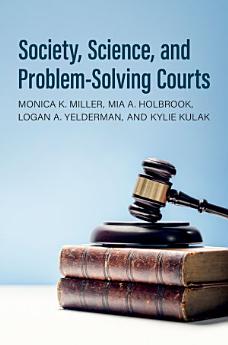Society, Science, and Problem-Solving Courts
Monica K. Miller · Mia A. Holbrook · Logan A. Yelderman · Kylie Kulak
Nov 2024 · Oxford University Press
E-Book
352
Seiten
family_home
Zulässig
info
reportBewertungen und Rezensionen werden nicht geprüft Weitere Informationen
Über dieses E-Book
Problem-solving courts are special courts that do not simply punish offenders, but use other justice principles—like therapeutic jurisprudence and restorative justice—and psychology principles—like anticipated emotion, operant conditioning, and social support—to address underlying social issues that contributed to the crime. The U.S. has numerous types of problem-solving courts, such as drug courts, mental health courts, and homelessness courts. Other countries do not have such courts, have altered versions, or have courts for other issues, like aboriginal courts. Comparison of these courts worldwide shows that many societies address their social issues through courts in dramatically different ways than do problem-solving courts in the U.S. Society, Science, and Problem-Solving Courts takes a broad social science approach to explain what societal factors brought about development of the wide variety of problem-solving courts, and what factors prevent such development or make problem-solving courts unnecessary. The book also investigates the role of science and technology in the development, enforcement, and evaluation of problem-solving courts. It is this combination of society and science that makes problem-solving courts possible.
Autoren-Profil
Monica K. Miller joined the University of Nevada, Reno in 2004 after receiving her J.D. and PhD from the University of Nebraska system. Her interests involve the application of psychological theories and justice principles to laws, policies, and court procedures. Specifically, she is interested in social cognitive biases (i.e., gender and religion-based prejudice) and individual differences in moral and legal decisions (e.g., jury decisions); how the law regulates the family; how community sentiment and science relate to law; how problem-solving courts address social issues; and the well-being of those who interact with the legal system (including the use of therapy dogs). Mia A. Holbrook joined the University of Nevada, Reno in 2019 after receiving her PhD in Criminal Justice and Criminology from Washington State University. Dr. Holbrook's research interests and expertise lie in evidence-based practices and model fidelity; program and policy evaluation; equitable practices in the criminal justice system; problem-solving and specialty courts; organizational trust & collaboration; perceptions & attitudes; and instrument validation. Logan A. Yelderman earned his BA in Psychology and Communication Specialist in 2011 from Baylor University and his PhD in Social Psychology in 2016 from the University of Nevada, Reno. His research interests involve topics at the intersection of social psychology, religion, and law with an emphasis on legal decision-making. His research typically includes experimental and non-experimental designs related to jury and parole decision-making, juvenile drug courts, religious fundamentalism, and the interplay between cognition and emotion. Kylie Kulak earned her BA in Psychology at Fresno State University in 2020, her MS in Psychology at Arizona State University in 2022, and is currently a Social Psychology doctoral student at the University of Nevada, Reno. Her research interests focus on emotions and extralegal factors that can influence jury decision-making, such as race and gender. She also has an interest in the therapeutic effects of facility dogs in the legal system.
Dieses E-Book bewerten
Deine Meinung ist gefragt!
Informationen zum Lesen
Smartphones und Tablets
Nachdem du die Google Play Bücher App für Android und iPad/iPhone installiert hast, wird diese automatisch mit deinem Konto synchronisiert, sodass du auch unterwegs online und offline lesen kannst.
Laptops und Computer
Im Webbrowser auf deinem Computer kannst du dir Hörbucher anhören, die du bei Google Play gekauft hast.
E-Reader und andere Geräte
Wenn du Bücher auf E-Ink-Geräten lesen möchtest, beispielsweise auf einem Kobo eReader, lade eine Datei herunter und übertrage sie auf dein Gerät. Eine ausführliche Anleitung zum Übertragen der Dateien auf unterstützte E-Reader findest du in der Hilfe.






